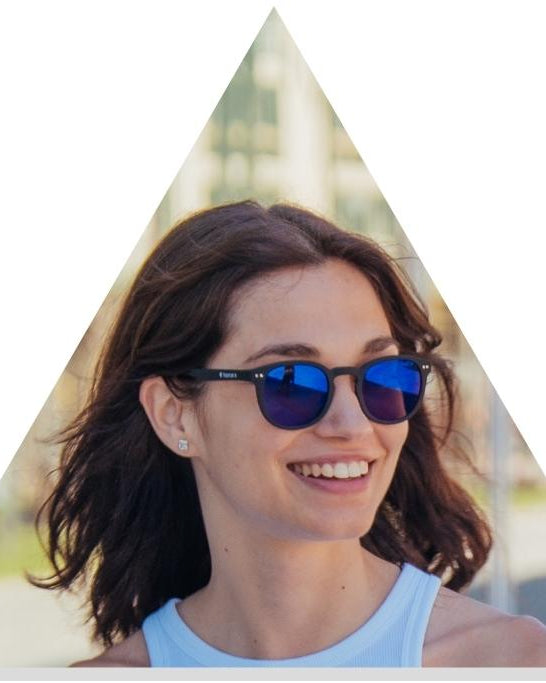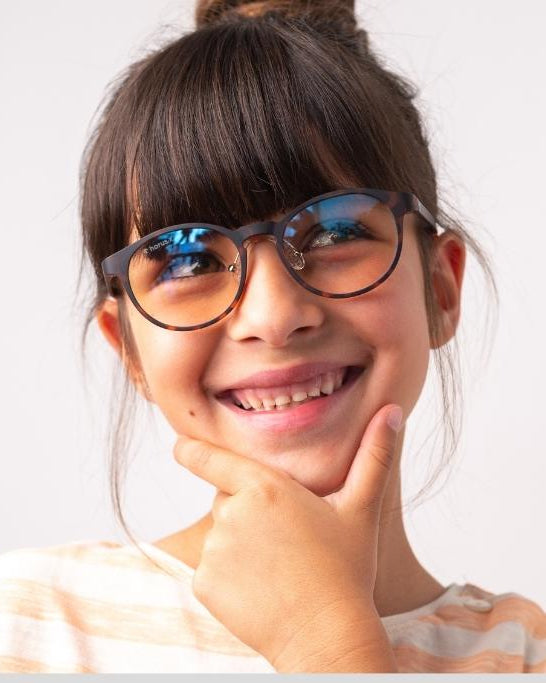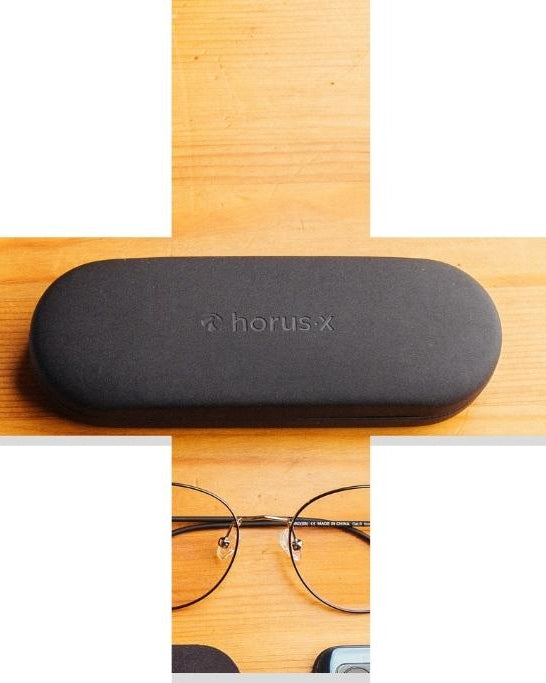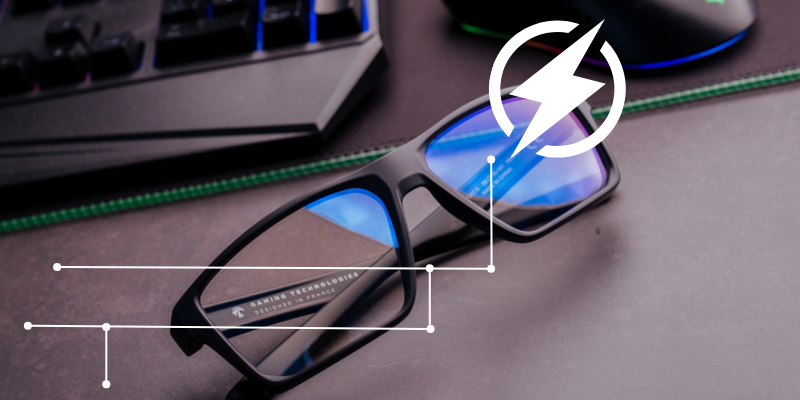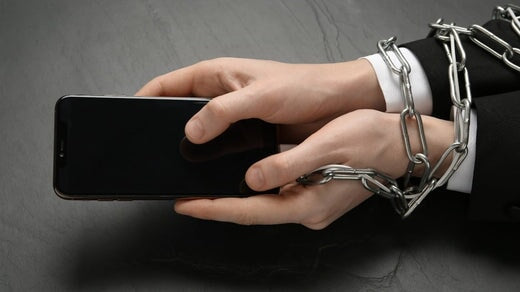There are many types of glasses. For sight, for comfort, just for style, sunglasses, blue light blocking glasses... Smart as you are, you may wonder if a combo is possible and ask yourself: do sunglasses block blue light?
The answer is yes and no, let's see how and why, and let's get rid of that nasty eyestrain.
How do sunglasses work?
Everyday we use technologies without necessarily knowing how they work. The majority of us just take the manufacturer's word for it and why shouldn't we. If we had to know how everything worked in order to properly use it, we'd never get anything done.
But when it comes to our eyes, it's a good thing to be a bit more skeptical than usual.
Did you know that our eyes were 10 times more sensitive to UV light than our skin?
It's a good reflex to put on sunglasses as soon as sunlight gets too bright outside. Preserving our eyes often will guarantee more years of healthy vision in the future.
Fear not, we are here for you to guide you in this quest.
Ambient light and Reflected rays

Sunglasses offer protection from UV light and from excessive brightness.
They protect you from ambient sunlight and from reflected rays.
In a nutshell, filtrating the light from the sun hitting a surface and bouncing off it, directly into our eyes.
A bit like Dragonite’s Hyper Beam.
There are many everyday examples where reflective surfaces can actually make sunlight seem even brighter: glass tables, metal surfaces, water, or even snow (which is actually one of the worst).
Say you have to drive on snowy terrain. The light bounces off the snow and reflects directly into your eyes, impairing your vision and making it harder to drive.
To help, you could purchase polarized sunglasses, which filter out even more of the reflected rays.
An important drawback of these types of glasses is that the screens on digital devices like your phone or watch can look blackened or even invisible when you wear them.
A note on direct light
Even while wearing sunglasses, no one is suggesting you go outside and stare directly at the sun.
It's far too bright for our eyes and could cause serious damage, even if you only look for a short period of time. For that, you'd need specific solar viewers (eclipse glasses).
Protection level offered by sunglasses
Not all sunglasses are created equal. Different lenses offer different levels of filtration and protection. There are currently 5 categories of filtration, according to European Standard requirements:
Category 0: 0-19% light filtration.
These sunglasses are typically found in supermarkets or in beachside shops, and are very cheap. They focus more on the comfort and aesthetics of the glasses than on protecting the eyes. So, despite where they’re usually found, they’re not recommended for a stay at the beach or drifting away from your island in Stranded Deep. Those glasses generally do not block UV rays!
Category 1: 20-57% filtration. These lenses are best used in low sunlight. This would be during winter (unless there’s lots of snow on the ground and bright sunlight), or in grey weather.
Category 2: 58-82% filtration. These lenses are best used in medium sunlight and can be effective for an average day of running errands (or hunting down Abby) in the sunshine.
Category 3: 83-92% filtration. These lenses are the most versatile and are perfect for all the classic situations where you’re exposed to bright sunlight for long periods of time. That could be on your local beach, on vacation, in the city, in the car, or trekking through the jungle with Nathan Drake.
Category 4: 93-97% filtration. These glasses are usually specialized, designed for bright bright sunlight most people wouldn’t usually encounter. For example, they are usually marketed toward those who climb glaciers or visit high mountains, where the light is particularly strong.

Do sunglasses block blue light?
Can regular sunglasses block blue light? The answer is simple: regular sunglasses are not designed against blue light exposure so they do not necessarily protect your eyes from blue light.
That's not to say that they don't filter some of it but they were not designed to specifically target blue light.
You can choose any glasses from the above 0-4 categories and still find blue light is able to enter your eyes.
Most sunglasses are simply just designed for a different function (UV + brightness), they may filter a bit of blue light but only as a by-product of what they were first intended for.
Expert recommandation : As a rule of thumb though, sunglasses that may offer some level of blue light protection will have a brownish tint.
However, in 2022, a new type of sunglasses has been created specifically designed for using screens outdoors and filtrating 98% of blue light (keep reading).
A note on blue light
Blue light comes from both natural and digital sources.
The majority of blue light comes from the sun and part of it is actually essential for your health. It regulates your sleep cycles and enables you to function properly during the day.
In the past, we were exposed to it in healthy amounts.
Today, in this ultra-connected world, we spend more than 5 hours a day in front of a screen, directly staring at artificial blue light.
This may throw our bodies out of balance, especially when receiving those rays at a time when your body should start to relax.
In any case today we receive more than our fair share of blue light causing more digital eye strain than necessary. That's why it's a pretty good idea to start blocking the most intense part of the spectrum, very close to UV light (from 380 to 450 nanometers to be exact).
What is the best way to protect yourself from blue light?
Now if you want to protect yourself from blue light, we advise getting a pair of glasses equipped with blue light blocking lenses and if you want to combine it with some outdoor protection, we've got just the thing as well (you're welcome).
At Horus X, we offer multiple types of glasses for different uses, like work or gaming.
Our Casual glasses have a clear lens and we advise using them more for work as they are very discreet, and stylish and filter up to 50% of harmful blue light as well as 100% of UV light.
Our Gaming 2.0 (or if you want the ultra top Gaming Revolution) glasses are dedicated to intense uses, especially video games. We know how intense gaming can be and how much it challenges our eyes long-term (ever been so engrossed you forget to blink until your eyes water?), so these glasses filter up to 86% of harmful blue light rays + 100% of UV protection!
But the big secret is the aforementioned brand new, anti-blue light sunglasses that we’re currently developing! This technology has finished R&D stage and will come out this very summer!
And guess what, it actually filter more than 98% of harmful blue light and of course 100% UltraViolet light (UV400), + it significantly protect you from harsh light.

Subscribe to our newsletter below, so you don’t miss any of our exciting announcements!
Final Thoughts: Protecting your eyes depending on your activity
Every time the sun shines during summer or rises over the rolling hills in Tsushima, we should put on sunglasses.
The amount of protection your eyes need can depend on the activity you’re doing. If you don't have sunglasses that also filter out harmful blue light, then you’ll need to choose your pair carefully depending on your day.
Are you going to hole up in your computer room, in front of a digital screen for hours, frantically hacking away at Melania? Or go for a stroll along the sun-soaked beaches in Malibu?
Either way, you need a good, but different pair of glasses. Remember, sunglasses are not a substitute for blue light glasses - and vice versa.
That is, unless you have the option of buying solar blue light glasses. In which case you’re one step ahead of the rest of the world, and only your superior intelligence can stop us all from becoming hollow.



